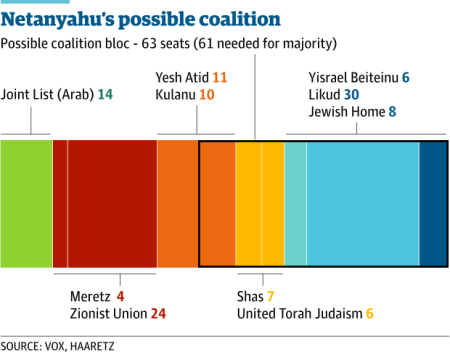Knesset 2015. Post-Election Remarks
 Israeli voters gave Prime Minister Benjamin Netanyahu a resounding victory in Tuesday's [17th Mar. 2015] election, despite pre-election polls showing him trailing the Zionist Union. The Zionist Union won close to the total it had been predicted by pollsters, and its 24 seats is more that Labour and Livni’s Hatnua won separately in 2013 (21). However PM Netanyahu’s Likud secured a decisive victory with 30 Knesset seats. Polls before election as well even exit polls differed vastly from the final figures.
Sure the Israeli left did better than it has done in almost a generation but it was not enough. One part of leftist campaign was sc V15 – Victory in 2015 - project of the One Voice group. The project was accused of being operated and funded by anti-right groups abroad, which gave the group money to set up an organization that would cause Netanyahu to lose. The group denied that it was representing foreign agents, and the Likud sought to have the group shut down, unsuccessfully.
Israeli voters gave Prime Minister Benjamin Netanyahu a resounding victory in Tuesday's [17th Mar. 2015] election, despite pre-election polls showing him trailing the Zionist Union. The Zionist Union won close to the total it had been predicted by pollsters, and its 24 seats is more that Labour and Livni’s Hatnua won separately in 2013 (21). However PM Netanyahu’s Likud secured a decisive victory with 30 Knesset seats. Polls before election as well even exit polls differed vastly from the final figures.
Sure the Israeli left did better than it has done in almost a generation but it was not enough. One part of leftist campaign was sc V15 – Victory in 2015 - project of the One Voice group. The project was accused of being operated and funded by anti-right groups abroad, which gave the group money to set up an organization that would cause Netanyahu to lose. The group denied that it was representing foreign agents, and the Likud sought to have the group shut down, unsuccessfully.Netanyahu picked a fight with a sitting U.S. president and declared there will never be a Palestinian State. The Prime Minister’s renunciation of the two-state solution and his boast that he will continue building in east Jerusalem were signs of his new hard-line approach. Netanyahu was able to surge in the last few days, following even a racist campaign that warned right-wing voters of a “left-wing government backed by the Arabs.” The warnings worked and moved 150,000 votes from other right-wing parties into the Likud column in the campaign’s final days which pushed him from 19 percent in the polls before the election to 23 percent on election night and cemented his position as the leader of Israel's right wing. Other right-wing parties were losers – Bennett and the settlers dropped to eight seats in the exit polls from 12, Liberman dropped five, and the far-right Yahad party didn’t even make it in.
As result Israel’s Prime Minister should be able to put together a ruling coalition of center-right parties that is more manageable than his last majority. PM Netanyahu’s nasty campaign alienated major parts of the public in Israel and abroad he put himself in a diplomatic corner e.g with U.S. and EU. The fact that Netanyahu openly campaigned on his opposition to Palestinian statehood means that now he is backed by a majority of Jewish/Israeli voters. Related to U.S PM Netanyahu will need to decide what to do if and when a deal about Iran does go through.
Results
Party
|
Votes
|
%
|
Seats
|
+/–
|
|
984,966
|
23.40
|
30
|
+12
|
||
786,075
|
18.67
|
24
|
+3
|
||
443,837
|
10.54
|
13
|
+2
|
||
370,850
|
8.81
|
11
|
–8
|
||
315,202
|
7.49
|
10
|
New
|
||
283,559
|
6.74
|
8
|
–4
|
||
241,200
|
5.73
|
7
|
–4
|
||
215,083
|
5.11
|
6
|
–7
|
||
211,826
|
5.03
|
6
|
–1
|
||
165,292
|
3.93
|
5
|
–1
|
||
125,106
|
2.97
|
0
|
New
|
||
47,156
|
1.12
|
0
|
0
|
||
Arab List
|
4,537
|
0.11
|
0
|
New
|
|
3,429
|
0.08
|
0
|
0
|
||
We are all
friends Na Nach
|
2,502
|
0.06
|
0
|
0
|
|
1,977
|
0.05
|
0
|
New
|
||
Hope for Change
|
1,519
|
0.04
|
0
|
0
|
|
Economy Party
|
1,050
|
0.02
|
0
|
0
|
|
Flower Party
|
943
|
0.02
|
0
|
New
|
|
941
|
0.02
|
0
|
0
|
||
886
|
0.02
|
0
|
0
|
||
Living with Dignity
|
562
|
0.01
|
0
|
0
|
|
503
|
0.01
|
0
|
0
|
||
Democratura
|
243
|
0.01
|
0
|
New
|
|
223
|
0.01
|
0
|
0
|
||
Invalid/blank votes
|
43,869
|
1.04
|
–
|
–
|
|
Total
|
4,253,336
|
100
|
120
|
–
|
|
Registered voters/turnout
|
5,881,696
|
72.36
|
–
|
–
|
|
Source: CEC
|
|||||
The new government
President Reuven Rivlin tried before elections to facilitate a Likud/Zionist Union coalition government, however both parties have ruled this option out. There is in theory also a possibility to centre-left government with ZU, Arab list, Yair Lapid’s Yesh Atid and Moshe Kahlon’s centrist party. The winner isn’t the party with the most votes, but the one that can unite several smaller parties together into a governing coalition. In 2009, Netanyahu became prime minister even though the Likud came in second on Election Day. However I think that now these alternatives are unrealistic.
President Rivlin intends to begin meeting the heads of elected Knesset parties on Sunday [22nd Mar. 2015], to receive their recommendations over who should form the next government. This is the first stage in the coalition building process and will almost certainly result in Rivlin inviting Netanyahu to build a coalition. Netanyahu will then have an initial four-week period to complete the process. Netanyahu has already contacted Jewish Home leader Naftali Bennett, Yisrael Beitenu head Avigdor Lieberman, Shas chairman Aryeh Deri, United Torah Judaism’s Moshe Gafni and Ya’akov Litzman, plus Kulanu head Moshe Kahlon. A coalition including all of these parties would guarantee a 67 seat majority in the 120-seat Knesset. Widespread media speculation suggests that Kahlon will become Finance Minister and incumbent Moshe Ya’alon will remain Defence Minister. Naftali Bennett will be appointed either Foreign Minister or Justice Minister. Avigdor Lieberman wants a senior role, but his negotiation position is weak with his Yisrael Beitenu party having secured just 5 seats. Senior Likud MKs including Gilad Erdan and Yuval Steinitz will also expect to be rewarded with prestigious ministerial positions. Meanwhile, Shas leader Aryeh Deri looks likely to become Interior Minister, a job he has previously held, while United Torah Judaism may be rewarded with the health portfolio.

Peace process?
Without any commitment to a two-state solution and Netanyahu’s boast that he will continue building in occupied east Jerusalem may increase pressure – not least from Europe – for moves towards sanctions against Israel. However in his first post-election interview (with Andrea Mitchell of NBC News), Prime Minister Netanyahu backed off his opposition to a Palestinian state. Binyamin Netanyahu has retracted his pre-election statements, according to which he would not allow a Palestinian state to be established. "I don't want a one-state solution. I want a sustainable, peaceful two-state solution," Netanyahu said Thursday [19th Mar.2015, AR] in an interview with MSNBC's Andrea Mitchell. "I haven't changed my policy." Netanyahu said his earlier comments were a reflection of changing conditions on the Palestinian side, pointing to Palestinian Authority President Mahmoud Abbas's pact to form a unity government with Hamas, which Israel, the U.S. and most European countries consider a terrorist organization. "I'm talking about what is achievable and what is not achievable," Netanyahu said Thursday, insisting that he would support a demilitarized Palestinian state under a plan that would ensure Israel's security. (Source: Virtual Jerusalem )
After earlier reports said that the Palestinian Authority was considering suspending all security cooperation with Israel in the wake of Binyamin Netanyahu's reelection, the PA officially announced Wednesday night that it was hoping to renew talks with Israel, regardless of who was Prime Minister. Nabil Abu-Rudeineh, the PA's official spokesperson, said that the PA has “no interest in the disposition of Israel's Prime Minister. The only thing we are interested in from any Israeli government is the recognition and acceptance of the two-state solution, with Jerusalem as the capital of the Palestinian state.” At a press conference in Ramallah, Abu-Rudeineh said that acceptance of the two state solution was the only basis of negotiation with Israel. (Source: Arutz Sheva )
 In my opinion a two-state solution is possible. The final status agreement has been very close at least since Beilin-Abu Mazen understandings/agreement/plan (1995) where nearly all issues were agreed. The Olmert proposal (2008) was probably the last serious try. (both plans can be found from my document library )
In my opinion a two-state solution is possible. The final status agreement has been very close at least since Beilin-Abu Mazen understandings/agreement/plan (1995) where nearly all issues were agreed. The Olmert proposal (2008) was probably the last serious try. (both plans can be found from my document library )My conclusions
My forecast is that if centre-right wing government continues after elections so nothing will change in peace process, the same is if there will be Likud/Zionist Union coalition government. If centre-left government will be established there might be a slight chance to go forward. In this case there is no need to start everything from the beginning as Mrs. Livni was participating to long negotiations during Olmert's time. If peace negotiations don't start or they fail again so there always is another option : unilateral actions; e.g. Israel could annex main settlements from West-bank inside the security fence and return to negotiations about other than so solved border issue when both parties feel need to make a long term deal. Not so bad option anyway from my perspective.
One key aspect with peace process is that historically Likud remains the only party to have withdrawn from Israeli territories – first from Sinai in 1982 under then-prime minister Menachem Begin as part of the peace agreement with Egypt and in 2005, under then-prime minister Ariel Sharon, it unilaterally withdrew from the Gaza Strip.
The optimist side of me would like to compare situation now with situation ten years ago. Ariel Sharon was war hero know about his hawkish attitude and his position was strong. After this election PM Netanyahu has now a strong mandate and he could make similar brave decisions and broke deal with Palestinian Authority based two-state solution and -67 armistice line – with land swaps to annex main settlements behind security fence to Israel. Remains to be seen if this optimism will be Utopian – I hope not.

Comments